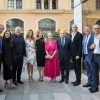Prestige published in July 2003 an interview with Walid Awad, the boss of Al Afkar magazine, passed away on June 29, 2019. This impressive man with a fabulous memory was throughout his life as a journalist looking for the new concept and the scoop. His comments on the importance of public relations in journalism, the Order of the Press and what it must do to protect the people of the profession are still relevant.
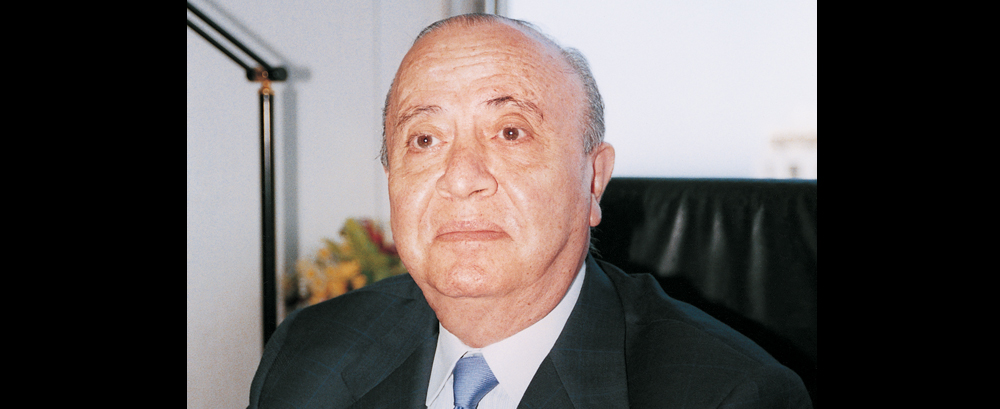
Can you tell us about your debut in the press?
It was in 1956, at Koul Chay magazine with … reports on disasters! The great earthquake of Chehim, and the flood of Abu Ali river that flooded the heart of Tripoli, it was then located further inland. This event led traders, jewelers, perfumers to settle in the new city.
You have this talent to find information. How do you do this?
My gateway into high society was the famous woman of the world Maud Farjallah. At her house, I met most of the politicians, Sami Solh, Rachid Karamé, Camille Chamoun, I could guess the information, lent an eager ear to gossip and rumors and I reported to Koul Chay. Everyone was intrigued: “But how do you do this?” I answered them enigmatically: “The secret of the profession”. Maud helped me a lot. I will also quote Sitt Jamilé el Khalil who was living in her residence in front of the racecourse. I was always at these receptions. Thus, I became a specialist of the genre, at a time when we could not separate social life from political life.
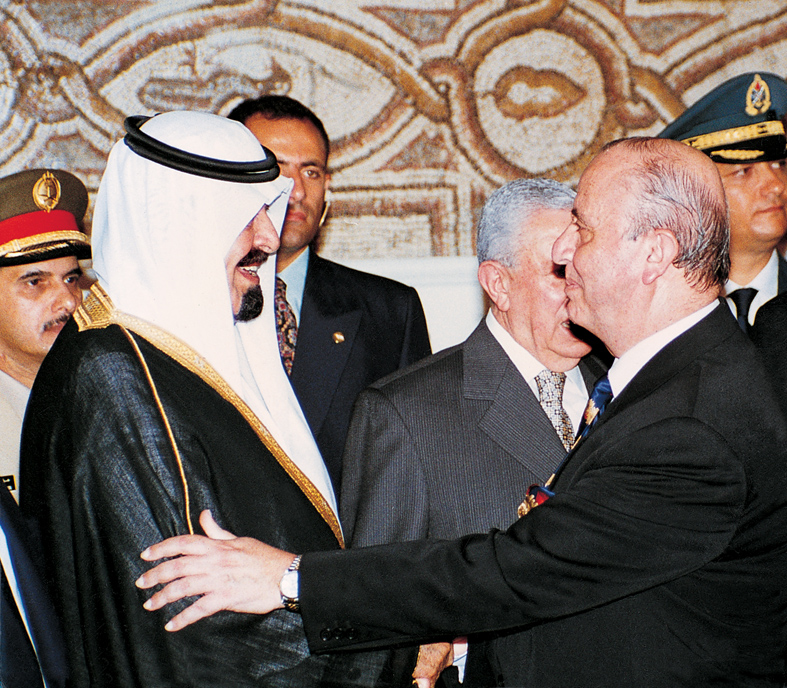
Between the magazine Hawadeth and Walid Awad, there is a long history rich in scoops and adventures. Through this magazine, you have established your career in journalism.
The day I met the founder of Hawadeth Salim Lawzi, I was struck to see him with two cameras around his neck. He was a great journalist exiled by King Farouk for revealing the truth about the scandal of sabotage weapons sent to Palestine for the Battle of Falouja. Lawzi fled to Lebanon. I met Salim Lawzi who offered me to work with him. I worked in two stages at Hawadeth, between 60 and 63, later I became Editor of Al Liwa magazine to return afterward to Hawadeth magazine.
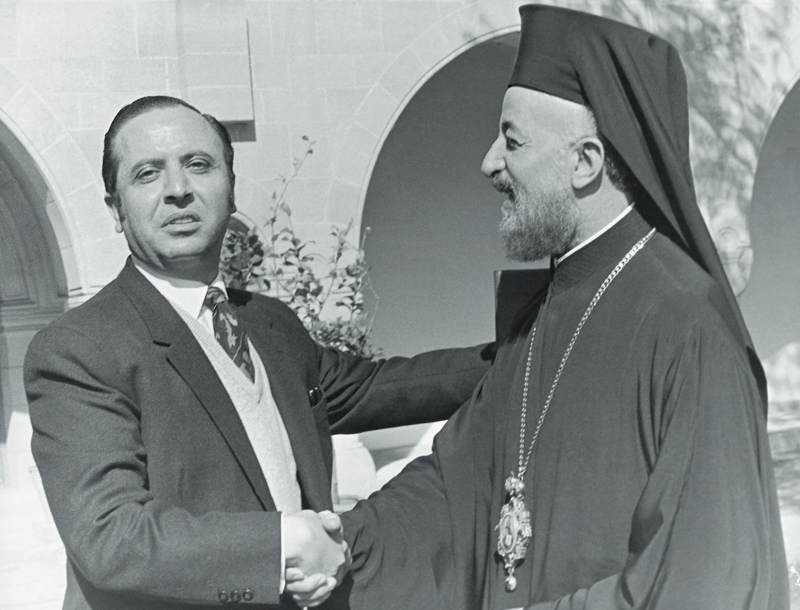
Monsignor Makarios
In 1971 Monsignor Makarios was the key figure in the news. All the press around the world was in Cyprus to catch a glimpse of him. The Sun, The Daily Telegraph, The World, The Figaro, The New York Times. I volunteered to meet him, it was a challenge because Makarios had specified that he will not give an interview. … I went to Mgr. Georges Khodr whom I knew well and asked him to help me. Arrived in Cyprus, I went to the Presidential Palace and met the director. «I would like to meet Mgr Makarios.» He told me categorically: «No interview.» «You will tell him that I come on behalf of Mgr Khodr, where you spent two days in Mina, Tripoli.» An hour passed, I called: He just said, «Welcome, Mister Awad.» Makarios opened and said: «A photo is everything?» We had a long interview. I came back to Lebanon and I handed the photos to Mr. Lawzi. He was jubilant, and he declared, «That’s a job!» He paid me a bonus and grossly increased my salary.
At Hawadeth, you did not hesitate to make reports on the ground.
I will give the example of the rebellion of Farouk el Mouqaddem in Tripoli in 1969. He took refuge with his militia at the interior of the citadel, quickly circled by the armed forces. I proposed to Salim Lawzi: «And if I went to interview him at the Citadel?» At the citadel, I was questioned by an army barrage: «What are you coming to do here?» «I want to enter the citadel, it’s my right. How are you going to prevent me?» I said to the military in the faction. I was sure that the military will not shoot on a journalist in mission. And I had a conversation with Farouk…When we wanted to leave, the sniper was active. Farouk told me: «I must shoot to cover you while leaving.» and he started the battle to create a distraction. We left by another issue. The bullets fell from everywhere…
You have the tastes of film lovers when was born this passion for cinema?
My uncle Khaireddine Awad was the owner of the Empire cinema in Tripoli, where a small stool was set up for little Walid. It was my headquarters. I watched dozens of times The thief of Baghdad, Gone with the wind, my favorite movie, all the films of Abdel Wahab. Today, I live in Sanayeh and regularly, I go to the movies next door. I empty my mind. It’s my way of de-stressing.
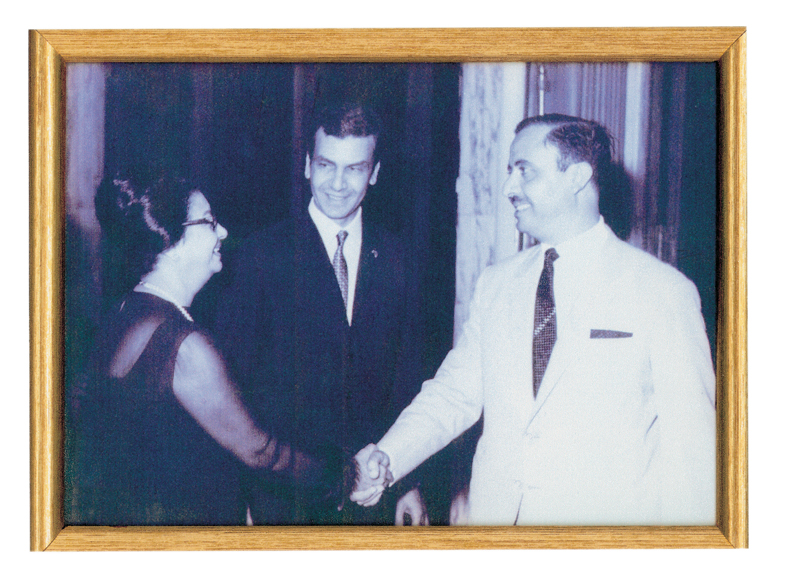
Umm kulsum, a lady who reigned with her voice over the Arab world, like others reign through politics. The Arabs did not agree on anything except Umm Kulsum. She was the one who gathered them together. Fayrouz is also a great lady, she has invited us more than once and to this day, every New Year, she sends me a turkey. I have great esteem for Fayrouz, who is in a way, the passport of Lebanon abroad.
You were friends with great stars of the Egyptian song.
It’s true that I like classical music, especially Rimsky-Korsakov and Verdi, but Abdel Wahab’s songs and patriotic songs have always touched me. I also like Abdel Halim Hafez, to whom a great friendship binds me.
Who are your favorite singers today?
First the inimitable Fayrouz and then Sabah, a great friend, the first star that allowed me to interview her while in my early days I collaborated with the Tripolitan daily Al Hadara. She was living in the northern capital, married to Nagib Chammas. Very few people know that she lived in Tripoli. I arrived at home with my little schoolbag in my hand. I must have been 17 years old. Sabah opened the door. I told her with the assurance of my youth, «My name is Walid Awad, a journalist.» She widened her eyes, «You, so young, journalist?»

When did you feel the need to have your own magazine?
After the death of Salim Lawzi, I decided to open my own magazine. I was tired of being an employee, I wanted to open my own business alone. My father was friendly of George Isaac Khoury who had the rights of a weekly Al Afkar and who had agreed to give them to me.

Chancellor Bruno Kreisky 1978
The press was invited to Vienna by the United Nations. I wanted to take advantage of this trip to interview Chancellor Bruno Kreisky. I went to Prime Minister Selim el-Hoss and told him: «I am going to Vienna, I would like a letter for Kreisky, as you are President of the Council, it will open doors for me.» He agreed to give me a verbal message to the Austrian statesman. Just arrived in Vienna, I called to make an appointment. Impossible, Bruno Kreisky was recovering from a gall bladder. With only twenty-four hours left, the simple idea of looking for the name Bruno Kreisky in the regional directory crossed my mind. I called with a beating heart. An assured voice answered me. «I am Bruno Kreisky.» «You have a message from Selim el-Hoss …» «Tomorrow, at ten o’clock in the morning I’m waiting for you.» He received me. I gave him the message: «The Lebanese President of the Council asks you to find out what happened to Sheikh Moussa Sadr.». On return to Lebanon, I submitted a condition: to be on the cover of the number with the interviewee. Salim Lawzi thought for a long time and sent me his agreement from London.
Al Afkar has undergone a remarkable evolution throughout its 21 years.
I would say this: many of my colleagues receive a thousand dollars, they put 900 in their pocket and invest 100 in their magazine, I am the opposite, I invest 900 and I get 100 for me. Every time the income increases, I invested and I modernize, computers, equipment, I make agreements with news agencies. At present, we have delegates in Egypt, Saudi Arabia, Syria … We are in constant progress. And I repeat to my daughter: «Give the editors their rights, and with the rest of the money, invest it in progress.»
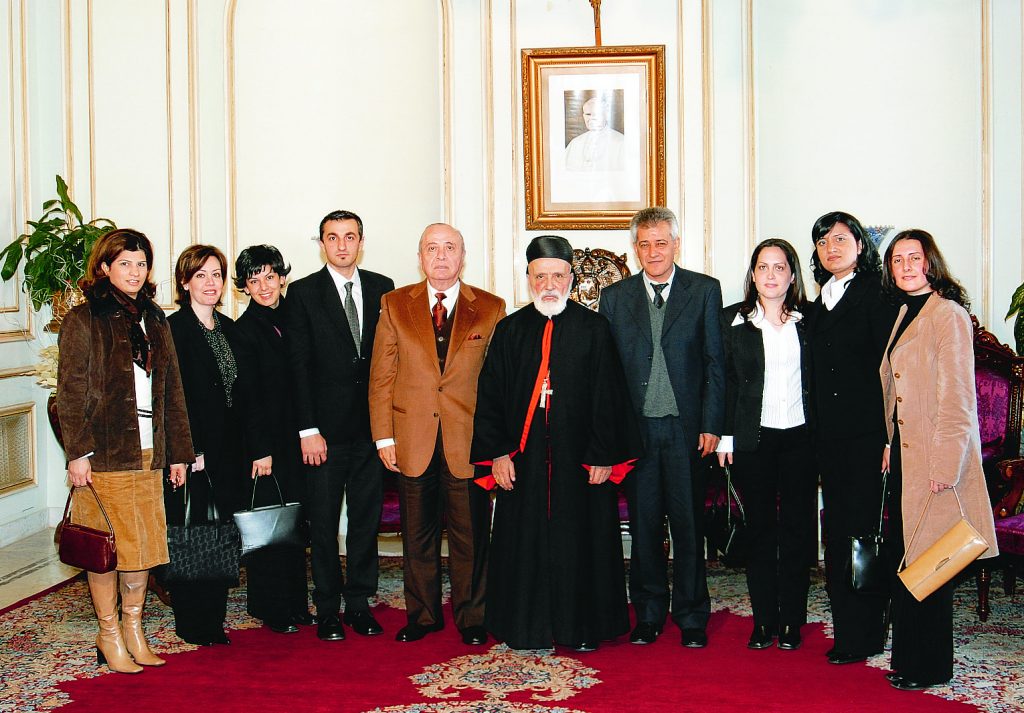
Very «social» journalist, you are a public relations expert, is it so important for your work?
I asked one day, the famous urologist Dr. Fakhri Alamé: «You are at all the evenings, but you’re a surgeon, what link have these outings with medicine?» He laughed: «50% of my success is due to my talent as a doctor and 50% to public relations. There is not an evening where we don’t make an appointment. Never neglect public relations.» As far as I’m concerned, I do not remember an evening where I do not catch the news or a rumor. It is impossible for a journalist to publish while remaining within four walls. The result owes it to both personal effort and interactivity with others. The most important asset in the press is how to encourage confidences. Some people are introverted. You have to know how to find the right key. For example, I say: «We tell that about you …» My interlude jumped and said to me: «Who, me, I …» And that’s it, I grab what I need, at the only condition not to do harm to anyone.
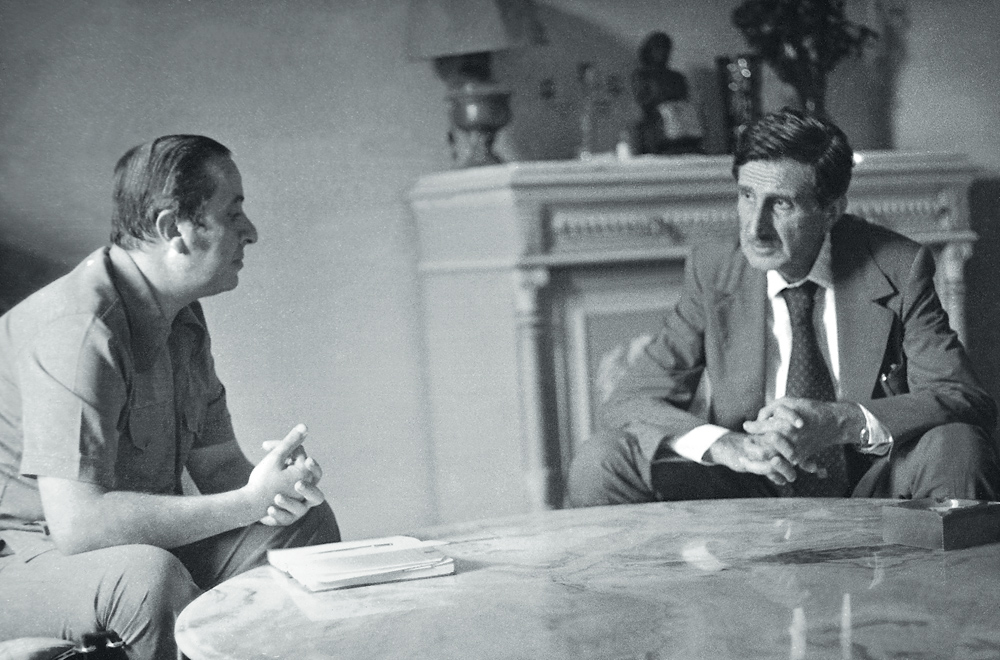
What we admire about you is that after so many years of work, you are driven by the same enthusiasm, the same energy …
I am surrounded by a competent team. I believe in collective leadership, I do not do everything, I supervise, especially the headlines, the choice of photos.
Do you think that photography is essential today for the survival of the print media?
The photo is a very important mode of expression, but the print media will not die, the proof is, we can zap a show on the small screen by remote control, but not the print media. You do not have time to read it? You will do it later, where you want when you want.
How do you evaluate your relationships with your colleagues?
I have respect and esteem for them. When an article pleases me, I do not hesitate to call the journalist to congratulate him.
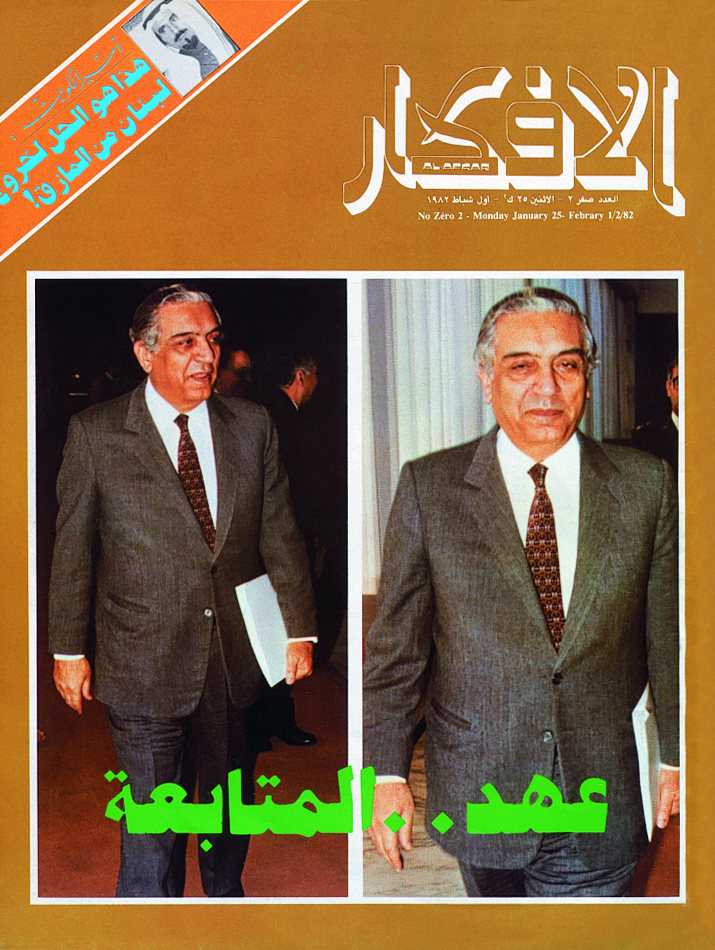
You are a member of the Order of the Press, if you were elected president one day, what would be your priorities?
Protecting serious journals that have required millions of dollars in investment, a stranger can release a publication for almost nothing to compete with other journals. There is no immunity for respectable magazines. Also, there should be a fair advertising distribution, under the supervision of the Order of the Press. The Order will assume greater responsibility for the protection of the rights of publications.
Your daughter Zeina is now director of Al Afkar, what about your other children?
Khaled, the elder who is an engineer, writes the economic page in Al Afkar, he lives between Beirut and Dubai, where he works at Internet City. My second daughter, Sawsan, married to an entrepreneur, lives in Tampa, Florida. Zeina Awad is a director of Al Afkar, currently, we are putting together a publication Machahir, celebrity magazine in Arabic, which will be published between Lebanon and Dubai.
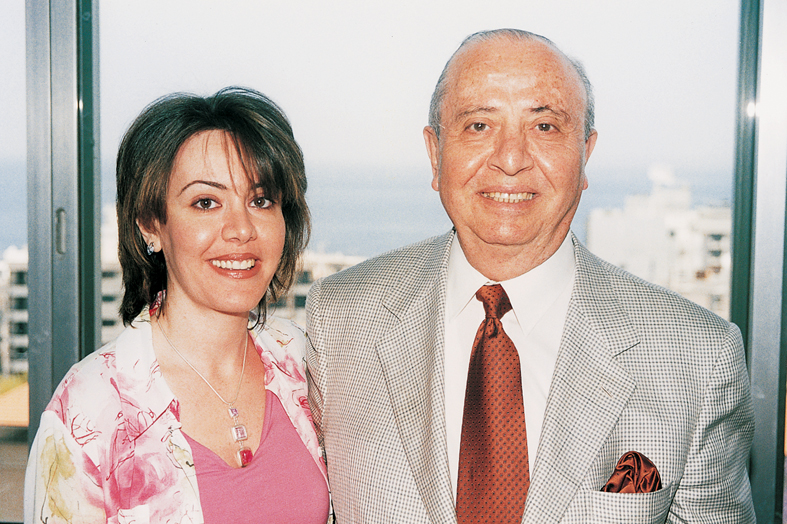
Zeina Awad, working in the press was it an unavoidable path?
In fact, I studied management and I volunteered to help the accounting department. It was just for an internship. I realized the chaos, the magazine needed better management. I learned to love journalism, and I did a BA in Journalism. It was natural …
Mr. Walid Awad, your dream of a journalist?
On a more prosaic level, open offices in Dubai, now the center of business and the Internet, also have an office in Paris. Publish a bilingual English-Arabic magazine, settle in downtown … On another intellectual level, I plan to found the club of Al Afkar. This club would gather all the “non-aligned” people, partisans of the policy: Lebanon first without giving up on the feeling of pan-Arabism, a club that would look like the Information Center of the Egyptian Al Ahram, a factory of thoughts, opinions and new ideas, through cenacles, debates, meetings …
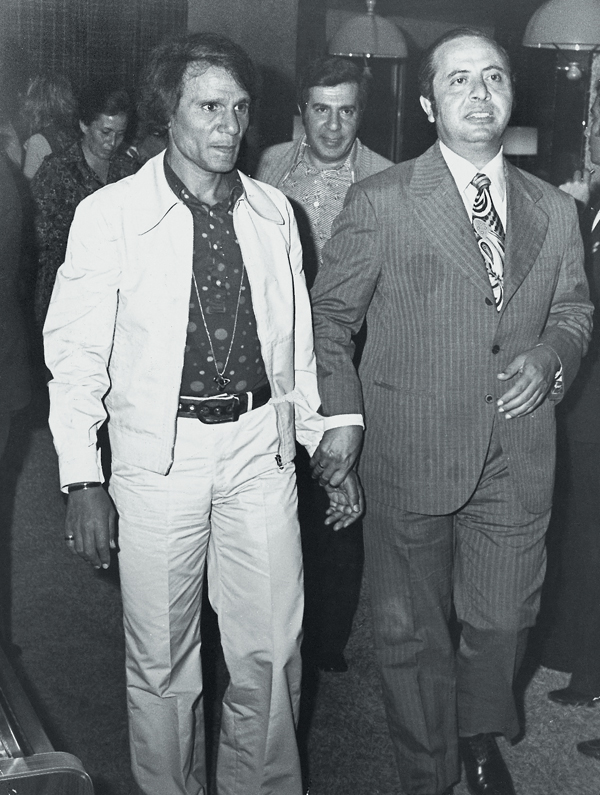
Abdel Halim Hafez returns one day to my office on the third floor of Hawadeth magazine. He said in a tired voice: «Let me rest a little.» And he fell asleep. When he woke up, he said, «Come on, come with me!»Where’s that ?!» «We go up to Our Lady of Harissa». In Harissa, we climbed the steps of the spiral staircases. Once at the foot of the statue, Abdel Halim removed his jacket, knelt down and began to implore the Virgin: «Our Lady, have pity on your son.» Abdel Halim was suffering from an incurable disease. When I went down, I pointed out to him: «We Muslims do not believe in the statues and material representations of the saints.» «I know, but I am a poet, I feel the presence of the Lady here intensely.»
You seem programmed like a computer. Tell us about 24 hours in the life of Walid Awad.
I am programmed according to the publication of the weekly, there is a closing date to respect, the magazine must appear on Friday. I go to bed at a specific time, after listening to the BBC or Radio Orient at 11 pm. Sometimes I attend televised debates, I like to know what and how people think. In the morning, I get up at seven, write my articles at home, my editorial requires a lot of effort, it’s like knitting, weaving, you need a clear, transparent mind. It’s the morning that I like to write. About eleven o’clock, I arrive at the office, I stay until the afternoon, except in case of unforeseen. My hobby? Formerly, billiards, today, I have more time, the press is my job and … my hobby. Interviewed by Marcelle Nadim




